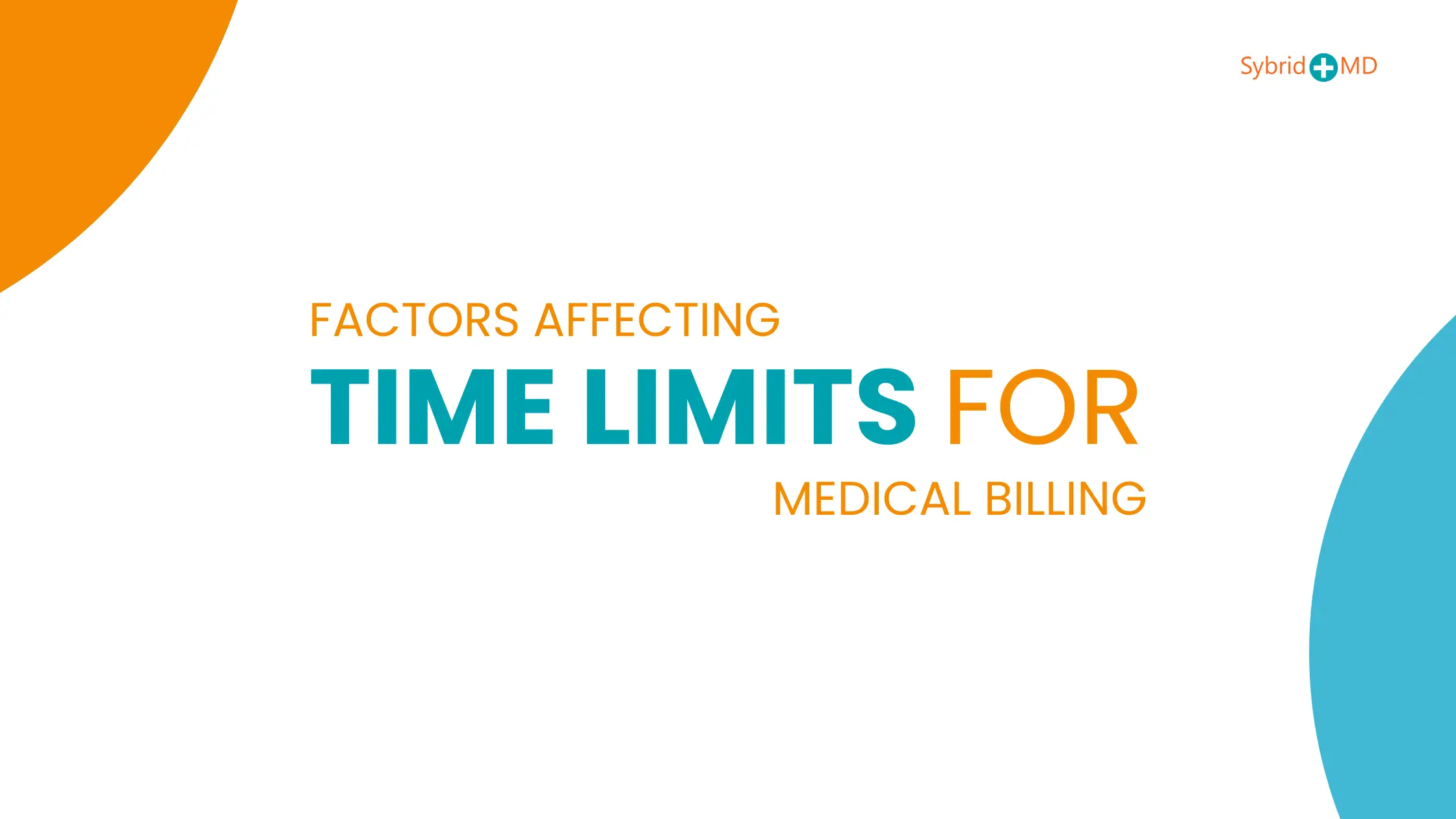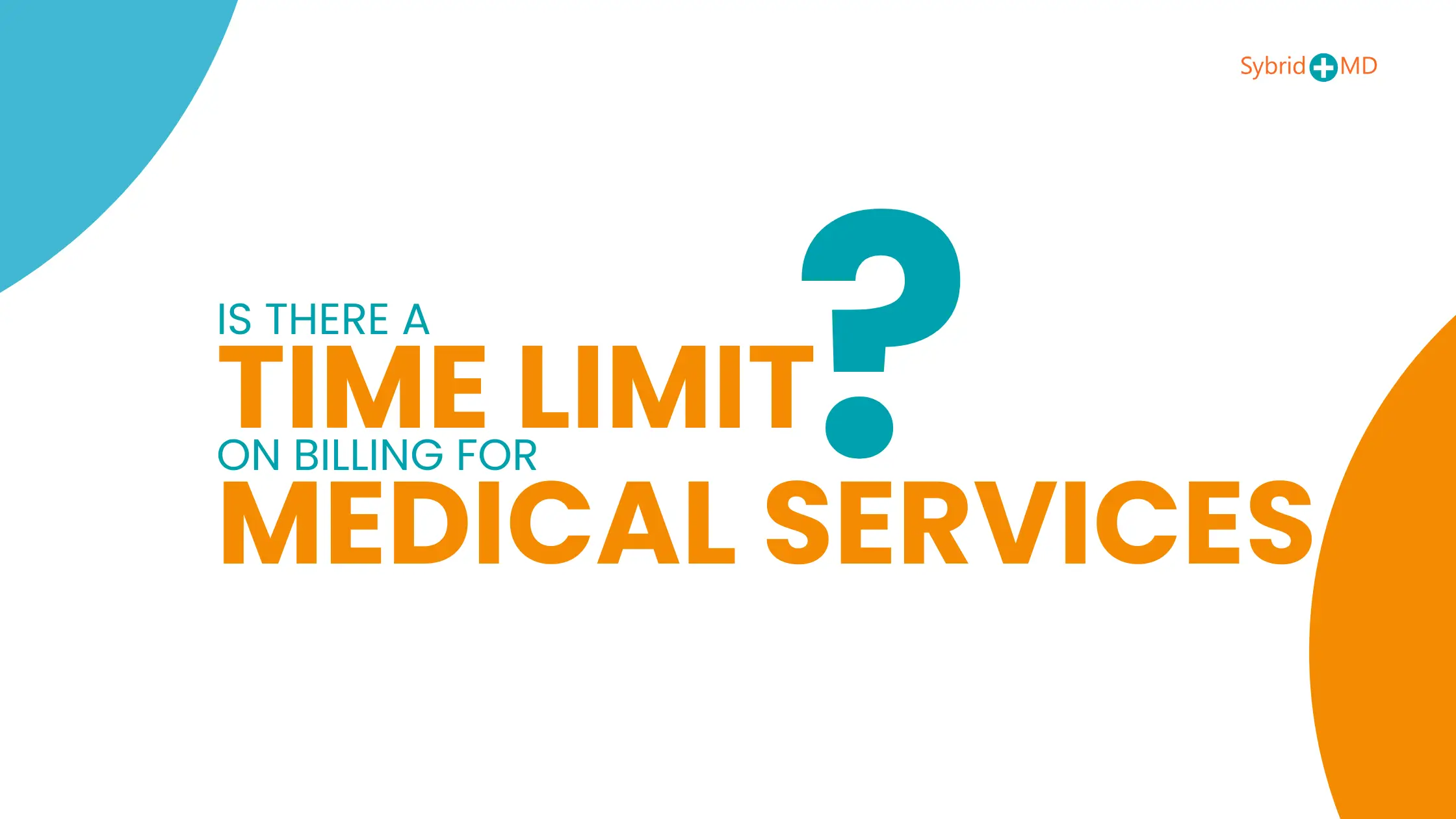The way healthcare providers submit healthcare claims for the services they offer to patients or third-party entities like insurance companies. Medical billing and coding is an essential part of the healthcare system, ensuring that medical services and procedures are appropriately paid for. However, there are specific periods of time that must pass before claims will be approved and paid.
Thus the statutes of limitations for medical billing are themselves varied by case, dependent simply upon the insurance company, the state or country, and the type of healthcare provider. Insurance contracts typically contain deadlines during which claims must be filed for payment consideration (30 to 180 days); a failure to file a claim in a proper timeframe allows the insurer to deny payment, and without that payment, the provider is left uncompensated for rendered services.
These time limits are extremely crucial for the seamless transactions of funds across the healthcare domain. For insurers, it reduces claim volumes and limits their exposure for not being fraudulent or inappropriate. Those timelines are crucial to healthcare providers because timely payment for goods and services they provide is an essential ingredient for their operation.
Is There a Time Limit on Billing for Medical Services?
When a provider submits a medical claim to a payer, there is a time limit to submit that claim. The deadline may vary from one insurance provider to another; the “timely filing” period is between 90 days to 365 days.
That deadline is based on the date that the provider provided the service, according to the insurance company. If you wait beyond the deadline to file the claim, the insurance company will deny the claim, and timely filing patient responsibility applies. In instances where this is the case, it’s normal for the patient to not be held responsible for the unpaid claim.
Fighting a Timely File Denial
If you are sure you filed the claim by the deadline and the insurance company is at fault, you have grounds on which to appeal the denial. If you do, hopefully, you keep good records; an EDI log or insurance correspondence can often make your case.
But even if you didn’t submit a claim by the deadline, you may have grounds by which to challenge the time limit for medical billing. Knowing how long medical providers have to bill you (it varies by state or contract) is key in these situations. You could then persuade the insurance company to revisit their denial with a detailed letter explaining their reasons for not filing the claim timely.
Factors Affecting Time Limits for Medical Billing

Revenue Cycle Management: Seamless medical billing helps ensure payment in a reasonable amount of time, reducing the delays and errors that can slow down a healthcare provider’s cash flow and financial solvency.
Legal Protection: Accurate billing follows legal guidelines, minimizing the likelihood of fines or audits due to coding errors or violations of healthcare legislation.
Patient Satisfaction (A Key Component of Quality Healthcare): It is enhanced by accurate billing and transparency of information; patients appreciate not being left with a dispute when they are sent on their way after receiving treatment.
Operational Efficiency: Streamlined billing processes not only reduce administrative burdens but also allow staff to prioritize patient care over resolving billing disputes or hunting down payments.
Reduce Errors: A robust billing system minimizes mistakes in coding and documentation, reducing the claim rejection and denial rates and increasing the chances of timely reimbursement by the insurance company.
Boosting Financial Health: Implementing effective strategies for billing and reimbursement helps maximize revenue, allowing investment into higher-quality facilities, technology, and services.
Common Time Limits for Medical Billing
Insurance companies have their own time limits, so it’s best to check with your insurance contract with your provider. Typically, medical billing deadlines span 90 to 180 days. You have a full year to file a claim with Medicare.
Essentially, if a patient comes in for treatment on March 10, you must submit a claim to their insurance carrier by June 10 for 90-day-limit providers or by September 10 for 180-day-limit providers. Every month that goes by, the insurance company can deny the claim if you don’t file it until November. Here, you would need to appeal or lose the revenue, which would affect your cash flow and disrupt your business.
Governmental Regulations
State governments protect patient interests, and many have passed laws to limit the incidence of surprise medical bills. Most of this legislation (the No Surprises Act) applies to out-of-network providers and how they provide estimates and bill patients/services. However, some states also impose limits on how long you have to file a claim after a medical service. Stay aware of the regulations in your area and ensure you maintain accurate records to comply with the laws to avoid incurring fines and penalties.
Consequences of Late Medical Billing
Late medical billing can be a serious problem for health facilities and patients. These include just so many consequences based just on a little payment delay that they can relate to the financial stability and reputation of healthcare organizations. Below are some of the key consequences of delayed submission of medical bills:
The Rules on Claim Denials:
Insurance companies usually impose deadlines for filing claims. If a healthcare provider fails to file a claim with the insurer before a certain time limit (typically between 30-180 days, depending on the insurer), the insurer may deny the claim altogether. “The impact of a denied claim is serious to the practice, and ultimately, the health care provider stops receiving payments or reimbursement for that service, which is a loss of income for the health care provider for services rendered which can make a significant impact on a financial burden,” added Davidson.
Higher Administrative Costs:
Late billing often requires extra administrative effort to address issues, whether that involves appealing denied claims or resubmitting paperwork. This increases the burden on billing departments, requiring yet additional resources to address the volume. Over time, this inefficiency leads to the rising operating costs of healthcare providers.
Complexities in Patient Billing:
If there is any delay or denial in claims from insurance agencies, patients will have to make direct payments for the services they provide. This can cause confusion and frustration in patients, who may not expect to receive the medical bills for unanticipated services, complicating collecting payments from patients. If patients cannot afford to pay, providers may have difficulty collecting payment for the services they provide, leading to financial burden.
Reputational Damage:
Healthcare organizations rely on their reputation to bring in and retain patients. Chronic late or inaccurate billing or other billing-related issues such as those involving insurance claim denials can really harm a provider’s reputation and lead to loss of patient trust and ultimately loss of business.” Patients desire visibility and efficiency, and billing hold-ups lead to disgruntled patients and poor ratings.
Ensuring Timely Medical Billing for Better Healthcare Efficiency
- Bad billing practice costs doctors in the US alone an estimated $125 billion per year – roughly $5 million per provider, according to Equifax.
- Those practices for medical billing are driven by best practices that drive the performance of your practice.
Verify Patient and Insurance Information and Eligibility
The billing process begins with the collection of patient demographics like name, date of birth, and insurance information (if any). Mistakes made in patient data lead to claim denials and delays in payments. To be sure, these are challenges that proper verification processes at the point of care can help address.
Medical billing software provides automated eligibility checks which minimize errors and improve the accuracy of patient information that raises the hospital claim acceptance rate.
Obtain Accurate and Timely Coding Practices
For successful claim submission, accurate medical coding is important. Common errors in coding, such as using outdated codes or incorrect modifier use, usually result in claim rejections and loss of money. Integrated applications such as SybridMD provide solutions for real-time feedback and help follow correct coding practices. Using these services helps in making your coding accurate and up-to-date, which in turn reduces errors and expedites the billing process.
Integrate EHR and Billing Software
By using EHR and billing software, which integrate well with each other, the manual entering of data can be reduced along with any errors. This means that the data from each system can be easily exported, imported, and synced, keeping all patient data accurate and error-free. EZClaim can easily integrate with numerous EHR systems to streamline your billing functions while minimizing errors.
An effective time limit on billing for medical services is necessary to maintain cash flow for another month, maintain financial health, and maintain good relations between healthcare providers and patients. By having an organized structure for your billing schedule, your practice is able to optimize medical billing productivity and secure more timely payments.
Conclusion
In conclusion, if the billing deadlines are missed due to any reason, it can cause claim denials, delayed payments, increased administrative costs, and patient dissatisfaction. In addition, it can tarnish the reputation of healthcare institutions, so efficient billing practices are crucial for effective operation. Following regulations, using technology, and inventing new processes can help health providers prevent errors, avoid penalties, and optimize reimbursement to continue providing quality care to patients.
FAQs
1. What happens if a medical claim is submitted after the time limit?
In brief, if a claim is lodged with an insurer after a reasonable time has passed, they might be able to deny it. In other words, barring successful rehabilitation of the denial through adequate proof of timely filing, the provider will not be compensated for such submission.
2. Are there exceptions to the time limits for filing medical claims?
Certain circumstances do fall beyond the cutting remittances. For instance, when a delay arises due to circumstances such as policyholder’s negligence, any of the insurance company employees’ factual mistakes, or as result of systems’ malfunctions, or even made the insurance claim. Such instances will be supported with relevant documents, such as an EDI log or insurance correspondence can often make your case, including electronic remittance advice (ERA) logs.
3. How can healthcare providers ensure the timely filing of claims?
They can help ensure that the deadlines get met by:
- Minimizing the errors made by using automated billing and coding and tracking deadlines.
- At the point of care, confirm the patient and their insurance details to avoid rejection of the claim based on this information.
- Designing a timetable for billing, alongside checking the quality of the claims, enhances the submission rate within a given period.

